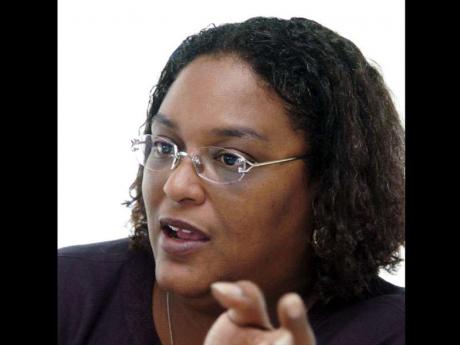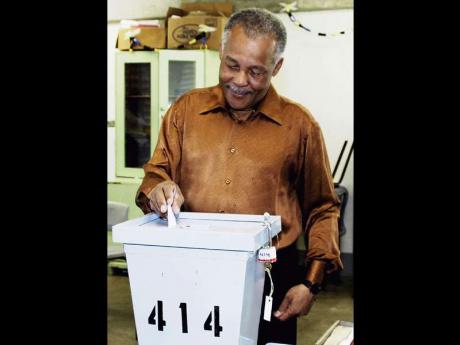Bajan Lessons
Barbados has done it again. Our little CARICOM sister has set an example of civilised behaviour, this time in a transition of political leadership.
Politics, even at its best anywhere, can be pretty nasty. Cut-throat competition for leadership can be pretty ugly. We have seen the depths to which Comrades descended in that last contest for the presidency of the People's National Party. We just need to replay the advertisements, which were not the worse elements of the contest, to pacify the expected rebuttals about party unity and about how healthy internal competition for leadership has been and how different from the Jamaica Labour Party's (JLP). Young turks, we are advised, quite literally had to plot a do-or-die act of subversion to dislodge Edward Seaga from the leadership of the JLP.
To challenge the leader of either of our political parties before they themselves choose to announce quitting is tantamount to treason. And the leadership contest for the powerful post of general secretary of the ruling JLP has been cast, in terms of a crisis within the party, so much so that the party leader and prime minister has felt obliged to call, from a public platform for party unity. Daryl Vaz's and Aundré Franklin's challenge to an incumbent Karl Samuda who hadn't yet announced that he was quitting is unheard of, and has the media salivating for blood. And the history of destructive acrimony within the party justifies the expectation of more.
Meanwhile, over in Barbados, the Opposition Barbados Labour Party (BLP) has surgically removed Mia Mottley as leader and installed former prime minister, Owen Arthur as leader of the Opposition. Arthur had voluntarily stepped down as BLP leader and leader of the Opposition shortly after the electoral defeat of the party in 2008. Defeated leaders never resign in Jamaica.
picture-perfect
Mottley's ouster was constitutionally picture-perfect. The parliamentary caucus of the BLP, in a meeting which the party leader and leader of the opposition was invited to attend and which she and two others declined to attend, unanimously declared no-confidence in Mottley as leader and endorsed Owen Arthur to be her successor. The group, led by BLP chairman, George Payne, then wrote to the governor general indicating, as per constitution, that "Owen Seymour Arthur is the person we support as the leader of the Opposition."
While regretting that differences in the party (which had never become a scandalous washing of dirty linen in the public eye) had come to this, Arthur was gracious in his acceptance. "As you would appreciate," he said, "this is a very difficult time for the country; it is a very difficult time for the party; it is a very difficult time for me."
Continuing, Arthur said, "I think the world of Mia Mottley. There is nobody else in public life in Barbados who I would have facilitated to enable them to become as much as they could be." And the long collaborative relationship that both have shared, both in government and in the party, lends strong credence to Arthur's declaration.
Naturally, Mia Mottley is upset and unhappy but has pledged her continued commitment to the Owen Arthur-led BLP, although she has accused the party of engaging in a kangaroo court to ensure her removal.
And speaking of kangaroos, the ruling party in Australia has removed its leader and prime minister, and then marched on to win a general election which was held only months after the ouster.
Barbadian politics has delivered an unprecedented level of national development. Starting out as an independent state in 1966, four years after Jamaica, almost totally dependent on sugar with per capita gross domestic product (GDP) and level of development of the same order as Jamaica's then, Barbados now boasts a per capita GDP of just a tad under US$19,000. Jamaica's is in the region of US$8,700, less than half of Barbados's.
So powerful was Jamaica in the Caribbean, Eric Williams of Trinidad is said to have remarked when Jamaica was withdrawing from the West Indies Federation that one from 10 leaves 0. Today, Jamaica only escapes being an economic liability in CARICOM because it is a valuable market for goods produced by the other territories in a massive trade imbalance.
As one website says of the Barbadian economy, "Since independence, Barbados has transformed itself from a low-income economy dependent upon sugar production, into an upper-middle-income economy based on tourism. Barbados is now one of the most prosperous countries in the western hemisphere, outside of the United States and Canada."
Barbados ranks 37/182 on the 2009 United Nations Development Programme's Human Development Index and is trending upwards, while Jamaica ranks 100th, 63 places lower, and is trending downwards.
One of the legacies of the Owen Arthur 14-year prime ministership, (1994-2008) which roughly coincides with the Patterson prime ministership in Jamaica (1992-2006) is the Barbados consensus. Building on the work of his predecessor, Arthur organised the country and implemented tough measures to move the economy out of recession and back into growth.
The same website notes, "The (Barbadian) economy went into a deep recession in 1990, after three years of steady decline brought on by fundamental macroeconomic imbalances. After a painful readjustment process, the economy began to grow again in 1993. Growth rates averaged between three and five per cent since then until 2001, when the economy contracted 2.8 per cent in the wake of the September 11 terrorist attacks and the global drop-off in tourism. Growth picked up again in 2004 and 2005, and the economy grew by 3.8 per cent in 2006." With this kind of track record it is easy to see why Owen Arthur would be recalled from youthful retirement back into party leadership.
P.J. Patterson has left no such legacy. But Arthur is not a magician standing alone on stage and pulling economic miracles out of his top hat. He is part of a system which is cleaner, more peaceful, more consensus-building and more productive than what we have built in Jamaica.
recessionary conditions
Former Jamaican prime minister, Edward Seaga wrote in these pages on Sunday, September 19, that "... Jamaica has been experiencing recessionary conditions for at least most of the last 40 years. The current global recession is, therefore really an overlay of this long-standing recessionary condition."
Furthermore, the former prime minister, party leader and at various times minister of development and minister of finance, "during the post-independence period covering nearly 50 years, fiscal expenditure was in excess of domestic revenue for 35 years, and foreign exchange current outflows were less than current receipts for every year except 1988, 1992 and 1994. This necessitated huge increases in the national debt to close the remaining gaps, positioning Jamaica in the exclusive category of one of the three most indebted nations in the world."
More than a decade ago (1998), the former class-struggle Marxist Don Robotham made an extra-ordinarily important point in his GraceKennedy Foundation Lecture, 'Vision & Voluntarism'. After describing the "sordid" horse trading in the British Parliament which made Emancipation possible, Robotham argued that the passage of the Emancipation Bill was only made possible "by the triumph of that very English spirit of compromise and deal-making."
Then he proposed that "the tradition of searching for the middle way is one part of the English tradition which we might do well to restore in Jamaica."
While we have focused on the issues that divide us, with the negative consequences socially and economically that we see all around us, Robotham suggests, others, including Caribbean states like Barbados have done much better, by working with the spirit of compromise and seeking the middle way.
I have seen and reported on the extraordinary results of this at work in the tiny, multi-ethnic, historically sugar-based island state of Mauritius, where the threat of ethnic strife has been replaced by peace, order and fair development under a political arrangement of accommodation.
Barbados has virtually no illiterate people. While I am not about to endorse their primary to tertiary free-education policy as the reason or propose it as a model for Jamaica, the literacy rate in Barbados is just 0.3 per cent off 100 per cent, the second highest in the world. Barbados graduates 98 per cent of its secondary level students, and 53 per cent go on to tertiary education. Perhaps the best thing we could do for raising literacy levels in Jamaica from the nominal 87 per cent or so and high school performance as measured by the Caribbean Examinations Council passes is to send a delegation to Barbados - if big island pride will allow!
Early last month, the unthinkable happened in low-crime Barbados: Six people were killed in one criminal attack. Two men with machetes, not guns, robbed a store then set it on fire killing six young women trapped inside. After the shock and outrage, within days suspects were apprehended.
There is so much to learn from Barbados. What "a wonderful thing, a very wonderful thing", as a religious folk melody runs, if a Jamaica consensus could emerge around our economic and social disasters, which are now "wrapped up and tangled up" in a global recession, on a scale not seen for 80 years. But the thirst for blood in our dirty politics, within and between the political parties, and in the general society itself may make no such thing possible.
Martin Henry is a communications consultant. Feedback may be sent to medhen@gmail.com or columns@gleanerjm.com.


